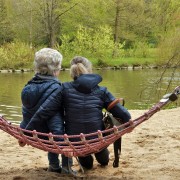Dining & Nutrition In Luxury Senior Living
As you read about and visit senior living communities in Athens, Georgia you will discover that many promote the amenity of fine dining. Fine dining suggests the community will offer its residents the experience of the upscale restaurant-style meal experience.
Independent living communities usually offer the choice option to pay for 1, 2, or 3 dining room meals daily while assisted living or memory care communities include all meals in their rental fees. There is an assumption that people living with health conditions benefiting from the support of assisted services will also benefit from the provision of meal preparation and nutritional support.
When touring luxury senior living communities you can expect to find kitchenettes in most apartments. Independent living apartments will have small sized full kitchens as some meals are expected to be prepared by the resident.
Assisted living apartments no longer include stoves, but are typically equipped with varying sized refrigerators, sinks, and microwaves. Most memory care apartment kitchenettes are now designed to include only a small area for storing personal snacks and it is more common to find sinks or refrigerators in communities that were built before 2015.
Orchard at Athens is a brand new assisted living and memory care community with a state of the art environmental design featuring high ceiling light-filled dining rooms, a private dining room, sweet shop, cafe and lounge, and apartment kitchenette options including granite countertops, spacious cabinets for storage, refrigerators, and microwaves.
Luxury senior living communities know that people like choice and not everyone has the time or interest in a formal dining experience for every meal. In most independent living communities you will find additional opportunities for purchasing food on the go. These might include a bistro-style menu of soups, sandwiches or salad, or a cafe with specialty coffees, muffins or pastries. And in some, you may even find a bar or lounge open for residents in the afternoon or evenings serving appetizers and beer, wine or cocktails.
Assisted Living Dining Options
Here are some things to consider about dining in assisted living:
- Is there a variety of meal options?
- Do menus change often and accommodate for resident preferences or special dietary needs?
- Are mealtimes on a set schedule or flexible?
- Are residents assisted with reminders or escorts to dining areas?
- Is there a policy or procedure in place to ensure residents or to meals or eat what’s provided for them?
- Are there enjoyment opportunities offered for resident cooking or baking?
- Can residents eat in their rooms when they desire and is there a charge for a meal delivery?
- Is there a nutritionist accessible for guidance about weight loss, weight gain, or poor appetites?
Dining With Dementia
Dementia is not just a memory problem and change in diet can be expected in time. Changing abilities in object recognition or fine motor skills will often affect a person’s ability to use utensils, swallow food, or have a desire to eat. As this can dramatically effect nutrition and quality of life it’s important to inquire about the following:
- Is there a variety of menu options to encourage an interest in eating?
- Are the meals offered on a set schedule?
- Is there ritual or routine in place to help cue the brain and body it’s time to eat?
- Are residents assisted with finding their place to eat?
- Are meals observed? Is there a documentation system in place to ensure residents eating or drinking activity?
- Are families consulted about dietary preferences or restrictions?
- Is hydration a priority?
- Is there communication with families should changes in the diet be observed?
- Are speech therapists available to assess change in swallowing ability effecting eating or drinking?
- Does the community provide adaptive utensils, cups, or dining ware?
- How is food served? Is it timely or do residents wait for long periods of time to eat?
- Is the staff skilled in hands-on support that encourages someone living with dementia to be as independent and successful as possible in eating or drinking?
Diet Modifications
Speech Therapist and swallow studies can determine when a modified diet is needed due to changes in physical or cognitive ability, which may include:
- Adaptive utensils
- Finger foods
- Chopped or pureed options
Two wonderful dining adaptation programs specific to dementia support include Grind Dining(c) and Dining with Friends.
Orchard at Athens is a luxury assisted living community located off Atlanta Hwy in Athens, GA. Orchard at Athens is an intentional community dedicated to providing physical and emotional support for people living with dementia at all states or stages of their disease progression.
Proud to offer the Grind Dining program for residents, you can be assured that Orchard will provide an optimal nutritional experience for your loved one. Please contact us to learn more about this program and other dietary questions you may have.





